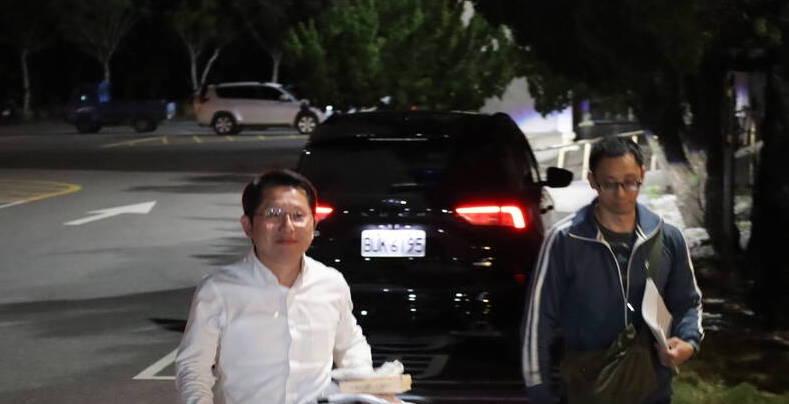The director of the Hualien County Civil Affairs Department has been detained, while six other public officials were released on bail today over allegations that the county government illegally sent representatives to people’s homes to verify their identity on a recall petition.
Last night, department Director Ming Liang-chen (明良臻), Deputy Director Wu Chun-yi (吳俊毅) and five other Hualien County Government officials were sent to the Hualien District Prosecutors’ Office for questioning.
The officials have been accused of contravening the Public Officials Election and Recall Act (公職人員選舉罷免法) and Personal Data Protection Act (個人資料保護法) by verifying recall petitioners’ household information in person.

Photo: Wang Chin-yi, Taipei Times
Prosecutors requested the Hualien District Court to detain Ming and restrict his communication pending a trial.
Wu, who also serves as secretary-general of the Hualien County Election Commission, was released on bail of NT$300,000.
The Hualien City Household Registration Office Director, surnamed Chung (鍾), was released on bail of NT$200,000.
Four other officials, surnamed Wang (王), Tsai (蔡), Hsin (辛) and Chen (陳), were released on bail ranging from NT$20,000 to NT$30,000.
The prosecutors’ office said yesterday that it opened an investigation after receiving evidence reported to the Supreme Prosecutors’ Office last month.
A Hualien resident reported that an official claiming to be from the household registration office went to their home to verify their signature on a petition to recall Chinese Nationalist Party (KMT) Legislator Fu Kun-chi (傅崐萁).
Prosecutors yesterday searched the county’s Civil Affairs Department and household registration office, bringing back 12 suspects and witnesses.

The Ministry of Economic Affairs has fined Taobao NT$1.2 million (US$36,912) for advertisements that exceed its approved business scope, requiring the Chinese e-commerce platform to make corrections in the first half of this year or its license may be revoked. Lawmakers have called for stricter enforcement of Chinese e-commerce platforms and measures to prevent China from laundering its goods through Taiwan in response to US President Donald Trump’s heavy tariffs on China. The Legislative Yuan’s Finance Committee met today to discuss policies to prevent China from dumping goods in Taiwan, inviting government agencies to report. Democratic Progressive Party Legislator Kuo Kuo-wen (郭國文) said

The Ministry of Economic Affairs has fined Taobao NT$1.2 million (US$36,900) for advertisements that exceeded its approved business scope and ordered the Chinese e-commerce platform to make corrections in the first half of this year or its license would be revoked. Lawmakers have called for stricter supervision of Chinese e-commerce platforms and more stringent measures to prevent China from laundering its goods through Taiwan as US President Donald Trump’s administration cracks down on origin laundering. The legislature’s Finance Committee yesterday met to discuss policies to prevent China from dumping goods in Taiwan, inviting government agencies to report on the matter. Democratic Progressive Party

Taiwan and its Pacific ally Tuvalu on Tuesday signed two accords aimed at facilitating bilateral cooperation on labor affairs, according to Taiwan’s Ministry of Foreign Affairs (MOFA). The governments inked two agreements in Taipei, witnessed by Foreign Minister Lin Chia-lung (林佳龍) and visiting Deputy Tuvaluan Prime Minister Panapasi Nelesone, MOFA said in a news release. According to MOFA, the agreements will facilitate cooperation on labor issues and allow the two sides to mutually recognize seafarers’ certificates and related training. Taiwan would also continue to collaborate with Tuvalu across various fields to promote economic prosperity as well as the well-being of their

Sung Chien-liang (宋建樑), who led efforts to recall Democratic Progressive Party (DPP) Legislator Lee Kun-cheng (李坤城), was released on bail of NT$80,000 today amid outcry over his decision to wear a Nazi armband to questioning the night before. Sung arrived at the New Taipei District Prosecutors’ Office for questioning in a recall petition forgery case last night wearing a red armband bearing a swastika, carrying a copy of Adolf Hitler’s Mein Kampf and giving a Nazi salute. Sung left the building at 1:15am without the armband and covering the book with his coat. Lee said today that this is a serious